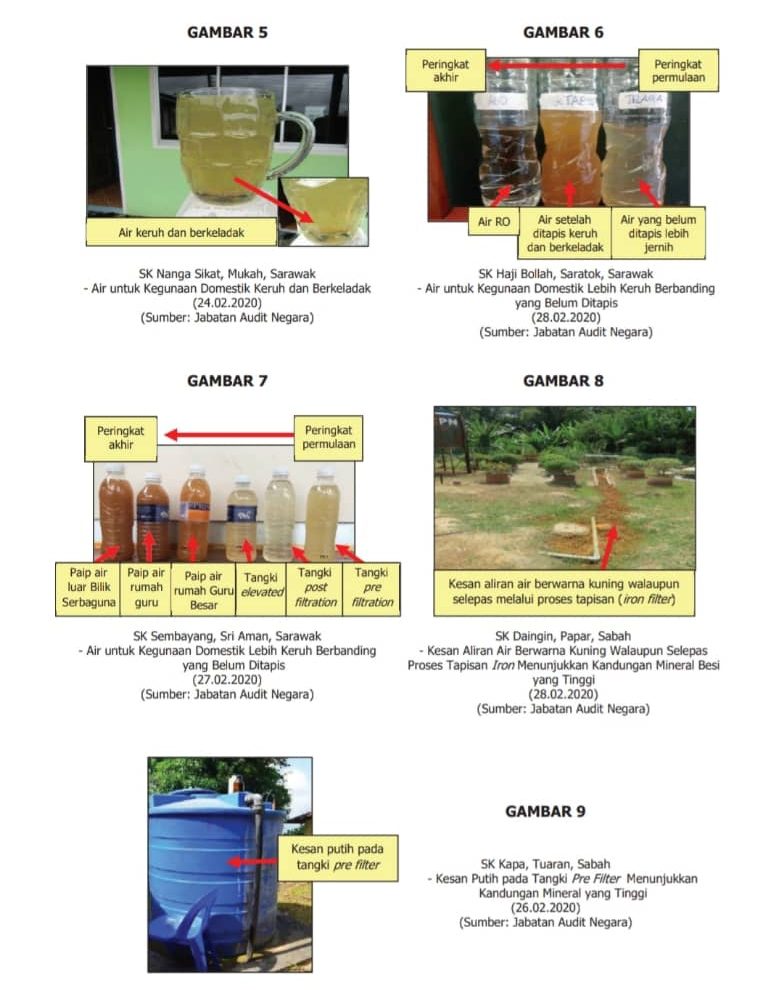
A page from the Auditor-General’s Report (LKAN) 2019 Series 1 shows water samples taken during its audit on tube wells in rural schools in Sarawak and Sabah.
KUCHING (Dec 11): The maintenance of the tube well system in rural schools in Sarawak and Sabah has been found to be inefficient and ineffective, the Auditor-General’s Report (LKAN) 2019 Series 1 said.
The report released yesterday said the cost of the maintenance contract from 2006 to 2021 totalled RM733.51 million.
It said that mainly due to lack of monitoring by the Ministry of Education (MOE), there was non-compliance to the terms of contract and Minerals and Geoscience Department (JMG)’s guidelines leading to the project not fully achieving its objectives.
In addition, it said there were also weaknesses in planning, appointment of contractor, contract administration, project implementation and management of the tube well system at the schools.
“Audit (Department) visited 48 schools in Sarawak and Sabah on February 24 to 29, 2020, found only 31 (64.6 per cent) of the tube well systems in good condition, while 14 others (29.2 per cent) in partially-good condition. This condition is due to the lack of water coming from the tube wells due to damage to the reverse osmosis (RO) system, power generation and electrical systems.
“However, the exact duration of the damage cannot be ascertained as there were no records being kept by the school. In addition, there were three tube well systems no longer being used because the schools were already linked to the public water supply system and maintenance work has been stopped,” it said.
It added that following an audit survey, it was found that 49 per cent of respondents disagreed there was sufficient water supplied from the tube wells.
This led to 28 or 58.3 percent of the schools audited to depend on other water sources such as gravity feed and rainwater harvesting systems.
The report also said that during the audit visit on the 48 schools, it was found that water quality at seven schools was at a very unsatisfactory level.
Four of the schools were in Sarawak namely SK Nanga Sikat, Mukah; SK Hj. Bollah, Saratok; SK Perpat, Saratok, and SK Sembayang, Sri Aman.
The three other schools were in Sabah namely SK Daingin, Papar, SK Belatik, Papar, and SK Kapa, Tuaran.
It also said the Ministry of Health carried out tests on samples from 47 schools from March 2 to 12 this year, and found the water at 15 schools in Sarawak and four schools in Sabah to be unsafe for consumption.
According to the report, tube well systems were built at 419 rural schools (223 in Sarawak and 196 in Sabah) from the years 2002 to 2016 at a cost of RM220.36 million as an alternative water source.
The tube wells are to be maintained at a cost of RM733.51 million in a contract from 2006 to 2021 to make sure the systems function properly and efficiently until the schools are linked to the treated public water system.
It revealed that as of January 31 this year, a total 334 schools (or 79.7 percent out of the 419) were still using the tube well system and received maintenance.
Maintenance of tube wells in 85 other schools (20.3 percent) which now receive treated water supply have been stopped.
In its audit recommendations, the report said MOE should take steps such as establishing a clear and detailed work procedure in the construction and maintenance of tube wells and take immediate action to review the terms of the existing contracts.
It also recommended increased supervision on the water quality and to take firm action against non-complying contractors.
The post A-G report: Tube wells in Sarawak, Sabah rural schools poorly maintained appeared first on Borneo Post Online.

